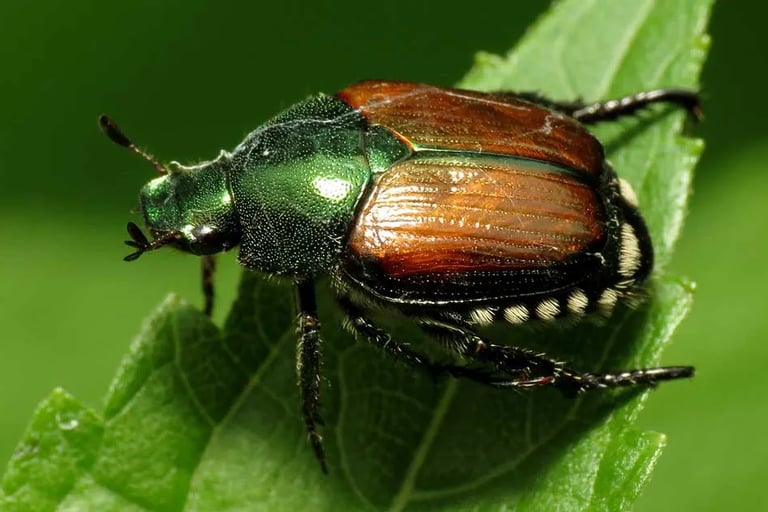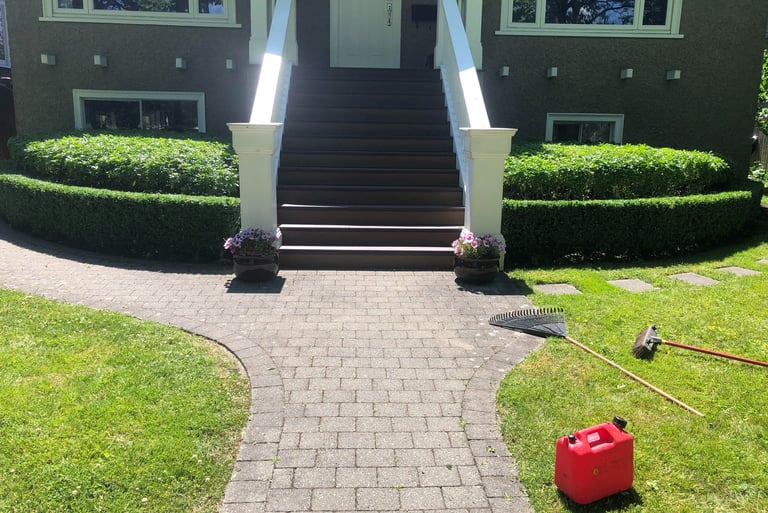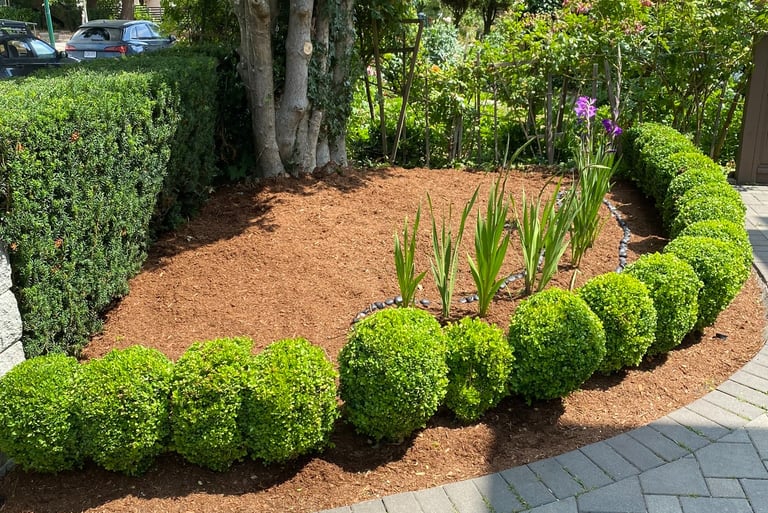
The Ultimate Vancouver Homeowner's Guide to Chafer Beetle Control
12/6/20247 min read
Understanding the Chafer Beetle Crisis in Vancouver
The European Chafer Beetle has become one of the most destructive lawn pests in Metro Vancouver since its first detection in 2001. These invasive insects have transformed from a minor nuisance into a full-blown crisis, affecting neighborhoods from West Vancouver to Surrey. Understanding these pests is crucial for every Vancouver homeowner looking to maintain a healthy, resilient lawn.
The Chafer Beetle Lifecycle in Vancouver's Climate
In Vancouver's unique coastal climate, the European Chafer Beetle (Amphimallon majalis) follows a specific lifecycle that makes it particularly challenging to control. Adult beetles emerge from the ground in late June to early July, typically between 9:30 PM and 11:00 PM on warm, clear evenings. This timing is particularly consistent in Vancouver's moderate summer temperatures.
The adults mate and lay eggs in our lawns during this period, taking advantage of Vancouver's warm summer evenings. By late July to early August, these eggs hatch into small grubs that begin feeding on grass roots. The grubs continue growing throughout fall and early winter, causing significant damage to lawns during this period.
Why Vancouver Lawns Are Particularly Vulnerable
Vancouver's climate creates perfect conditions for chafer beetle infestations. Our mild winters allow grubs to continue feeding longer than in colder regions, while our wet falls and springs provide ideal soil conditions for their development. According to the City of Vancouver's Parks Board, lawns in neighborhoods like Dunbar, Kerrisdale, and parts of East Vancouver have been particularly hard hit.
Identifying a Chafer Beetle Infestation
Early detection is crucial for effective control. In Vancouver, the first signs typically appear in late summer to early fall. Here's what to look for:
Lawn Damage Signs
The most obvious sign of chafer beetle activity is irregular brown patches in your lawn, particularly noticeable from September through March. These patches often feel spongy when walked on, as the grubs have destroyed the root system below.
Wildlife Damage
A unique indicator in Vancouver is increased activity from crows, skunks, and raccoons. These animals are particularly active in local neighborhoods, tearing up lawns to feed on the grubs. This secondary damage often causes more destruction than the grubs themselves.
Professional Assessment
Local lawn care experts, such as those from Para Space Landscaping or Aesthetic Landscaping, can perform specific tests to confirm chafer beetle presence. These tests typically involve examining soil samples to count grub populations.
The Impact on Vancouver Properties
The economic impact of chafer beetles on Vancouver properties is significant. According to local real estate experts, a damaged lawn can reduce property values by 5-10%. The Real Estate Board of Greater Vancouver notes that curb appeal is crucial for property values, and a damaged lawn can significantly impact a home's marketability.
Treatment Windows in Vancouver's Climate
Vancouver's unique climate creates specific windows for effective treatment:
Prevention Period (May-June)
This is the crucial time for applying preventive measures before adult beetles emerge. Vancouver's typically dry early summer provides ideal conditions for applying nematodes and other preventive treatments.
Active Treatment Period (July-August)
This period aligns with egg-laying and early grub development. The City of Vancouver permits nematode application during this time, provided proper watering restrictions are followed.
Monitoring Period (September-March)
During Vancouver's wet season, monitoring for damage and planning next year's treatment strategy is essential.
Effective Treatment Methods for Vancouver Lawns
Biological Control with Nematodes
In Vancouver, where chemical pesticides are banned for cosmetic use, beneficial nematodes have become the primary defense against chafer beetles. These microscopic worms naturally prey on chafer beetle larvae. According to the UBC Botanical Garden, proper nematode application is crucial for success in our climate.
Application Timing
The optimal time to apply nematodes in Vancouver is between late July and early August, when soil temperatures consistently remain above 15°C (59°F). According to Environment Canada data, Vancouver's average soil temperatures during this period create ideal conditions for nematode activity.
Application Process
Local retailers like Art's Nursery and GardenWorks stock fresh nematodes during the application season. The process requires:
Thorough watering before application
Application during overcast conditions or evening hours
Consistent moisture for at least two weeks following treatment
Special watering permits are available from most Metro Vancouver municipalities during nematode application periods, even during water restrictions.
Natural Lawn Renovation Strategies
Converting to Chafer-Resistant Grass Species
Vancouver's climate supports several grass species that show natural resistance to chafer beetles. Working with local suppliers like Western Turf Farms in Abbotsford, homeowners can choose from:
Micro Clover Lawns
Increasingly popular in Vancouver, micro clover lawns resist chafer beetles while staying green year-round despite our wet winters. They require less irrigation during our dry summers and maintain color during drought conditions.
Tall Fescue Varieties
Deep-rooted tall fescue varieties show excellent resistance to chafer damage and adapt well to Vancouver's clay-based soils. They perform particularly well in our region's shaded areas and wet conditions.
Alternative Ground Covers
For severely affected areas, especially in Vancouver's shadier neighborhoods like North Vancouver or parts of Point Grey, consider these alternatives:
Native Ground Covers
The Vancouver Native Plant Society recommends several native ground covers that thrive in our climate and resist chafer beetles, including Salal and Kinnikinnick.
Moss Gardens
In shadier Vancouver properties, particularly those with mature trees, moss gardens can provide an attractive, low-maintenance alternative that's immune to chafer beetle damage.
Cultural Control Methods
Proper Lawn Maintenance for Vancouver's Climate
Mowing Height Adjustments
Maintain grass at 6-7.5 cm (2.5-3 inches) during our growing season. This height promotes deeper root growth, crucial for surviving both chafer damage and our dry summers.
Soil Management
Vancouver's naturally acidic soils need regular attention. Annual soil tests through Pacific Soil Analysis can guide proper pH adjustment, typically requiring lime application in our leached soils.
Irrigation Practices
Given Vancouver's distinct wet and dry seasons, proper irrigation is crucial:
Spring (March-May): Light, infrequent watering to encourage deep root growth
Summer (June-August): Deep watering following Metro Vancouver's watering restrictions
Fall (September-November): Reduced watering to discourage chafer beetle activity
Professional Intervention
When to Call the Experts
Sometimes, despite best efforts, professional intervention becomes necessary. Local companies like Larix Landscapes Victoria offer specialized chafer beetle treatment programs tailored to unique conditions.
Professional services typically include:
Comprehensive lawn assessment
Customized treatment plans considering local microclimate conditions
Proper nematode application with specialized equipment
Follow-up monitoring and adjustment of treatment strategies
Prevention Strategies for Vancouver Properties
Creating an Unfavorable Environment
Understanding Vancouver's unique soil composition and climate patterns is crucial for long-term chafer beetle prevention. The BC Landscape & Nursery Association recommends several preventive measures specifically designed for our coastal climate.
Soil Health Management
Vancouver's naturally acidic soils require regular maintenance to create conditions that discourage chafer beetles. Working with local soil testing facilities like Element Materials Technology, homeowners should:
Test soil pH annually, typically in early spring before the growing season begins. Vancouver's heavy rainfall tends to leach calcium from our soils, making them more acidic over time. Maintain a pH between 6.0 and 6.5 through regular lime applications, particularly important in areas like North Vancouver and the North Shore, where rainfall is heaviest.
Implement core aeration in early spring or fall when soil moisture levels are optimal. This practice is particularly important in Vancouver's clay-rich soils, which tend to compact easily during our wet winters.
Long-term Solutions for Vancouver Homeowners
Integrated Pest Management (IPM)
Following guidelines from the City of Vancouver's Integrated Pest Management program, successful long-term management includes:
Natural Predator Attraction
Install bird houses and bat boxes to attract natural predators. The Pacific Northwest is home to several beneficial bird species that feed on adult chafer beetles, including robins and starlings.
Beneficial Insect Habitat
Create areas in your garden that attract ground beetles and other beneficial insects that naturally prey on chafer grubs. According to the Vancouver Park Board, maintaining diverse garden areas near lawns can reduce chafer beetle populations naturally.
Community-Based Approaches
Neighborhood Coordination
Some Vancouver neighborhoods have successfully implemented community-wide treatment programs. Areas like Kitsilano and Mount Pleasant have seen better results when neighbors coordinate their treatment timing and methods.
Working with local community gardens and neighborhood associations can help coordinate:
Synchronized nematode applications
Shared equipment and resources
Bulk purchasing of treatment materials
Information sharing about successful strategies
Seasonal Maintenance Calendar for Vancouver
Winter (December-February)
Monitor for wildlife damage
Document affected areas for spring treatment
Plan renovation strategies for damaged areas
Spring (March-May)
Conduct soil tests
Apply lime if needed
Begin lawn renovation in damaged areas
Implement core aeration
Summer (June-August)
Apply nematodes during optimal conditions
Maintain proper mowing height
Follow water restrictions while ensuring adequate irrigation for nematode effectiveness
Fall (September-November)
Reduce irrigation to discourage beetle activity
Monitor for early signs of new damage
Apply compost top dressing to strengthen turf
Frequently Asked Questions
Q: When is the best time to apply nematodes in Vancouver?
A: The optimal time is late July to early August when soil temperatures consistently remain above 15°C (59°F). Evening application is recommended during this period.
Q: How long does it take to see results from nematode treatment?
A: In Vancouver's climate, results typically become visible within 2-3 weeks after application, though full effectiveness may take up to 6 weeks.
Q: Are there any chemical treatments available for chafer beetles in Vancouver?
A: No, chemical pesticides for cosmetic lawn care are banned in Vancouver. Only biological controls like nematodes are permitted.
Q: How much does professional chafer beetle treatment cost in Vancouver?
A: Professional treatment typically ranges from $300-$600 for an average-sized lawn, including nematode application and follow-up monitoring.
Q: Can I apply nematodes during water restrictions?
A: Yes, special permits for nematode application are available from most Metro Vancouver municipalities, even during water restrictions.
Don't let chafer beetles destroy your Vancouver lawn. Contact our team of local lawn care experts for a free assessment and customized treatment plan. We understand Vancouver's unique challenges and can help protect your lawn using proven, environmentally friendly methods.
For more information about chafer beetle control or to schedule a consultation, visit our website or call us at 604 339 9217. Our experts are familiar with Vancouver's specific challenges and can provide solutions tailored to your property's needs.






Where And What Services We Do
Services
Service Locations
UBC - Cambie - Dunbar - West Vancouver - North Vancouver - West Point Grey - Shaughnessey - Richmond - Kerrisdale - South Vancouver - East Vancouver - Kitsilano - Burnaby - Mount Pleasant
Use these link to navigate if you are looking for a specific service. Or wondering about specifics for you exact location.
Contact
Blossomscaping@gmail.com
+1-604-339-9217
© 2024. All rights reserved.
Where we service
3158 W 34th Ave, Vancouver, BC V6N 2S2
UBC - Cambie - Dunbar - West Vancouver - North Vancouver - West Point Grey - Shaughnessey - Richmond - Kerrisdale - South Vancouver - East Vancouver - Kitsilano - Burnaby - Mount Pleasant - Oakridge - Arbutus Ridge - Marpole - Southlands - Victoria-Fraserview


Proudly Servicing Vancouver, British Columbia
What we service
